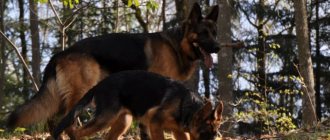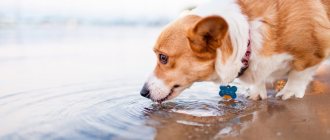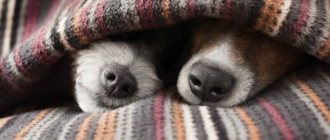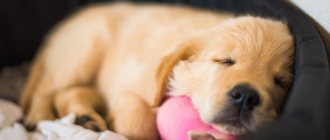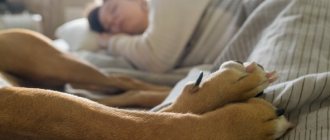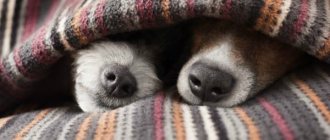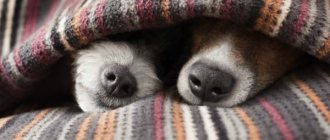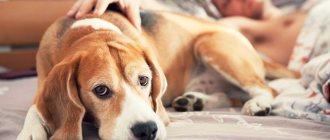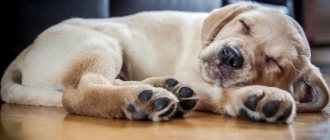Sleep is an integral part of any living being. During dreams, a pet gains strength and energy for future achievements. Lack of sleep can cause your pet to become irritable and fatigued. Therefore, every owner should know how much dogs sleep per day. This information will help the owner of his four-legged friend pay attention in time to the fact that the dog is suffering from insomnia or lack of sleep, and take appropriate measures.
Stages of sleep in dogs
How long should a dog sleep: stages of sleep in dogs
It has been established that the structure of dog sleep is no different from human sleep and includes several stages:
- Nap . The primary stage of sleep, contributing to the partial restoration of vital energy. A dozing dog is in a relaxed state, but can control what is happening.
- Superficial (shallow) sleep . The second stage, during which tissue repair processes are activated in the animal’s body. The dog is completely relaxed, but is able to detect loud sounds.
- Deep dream. Replaces the phase of superficial sleep and is characterized by the absence of dreams. In the deep stage, the dog rests fully, snoring or snoring.
- Quick sleep. The shortest phase, accompanied by increased brain activity and processing of received impressions. A dog that is sleeping begins to twitch its paws, move its eyes closed, change body position, wag its tail, whine or bark.
The REM sleep phase is followed by complete awakening or a transition to the deep stage.
Sleep disorders
Often, the owner may ignore sleep disturbances in his pet, considering it a temporary problem that will quickly pass. It is important to understand that sleep problems are often caused by some dysfunctions in the body. This can manifest itself as an internal disease or a disease of the nervous system. Here are the signs to look out for:
- The animal cannot lie down comfortably. This may be due to the fact that the lounger is uncomfortable for him, or he has painful sensations in the joints.
- At night, he often asks to go to the toilet, although the pet “did” its business while walking. The symptom may mean that the dog has a cold in the kidneys.
- A sharp jumping up of a shaggy friend in a dream. This is often seen in young and energetic dogs that have been running around too much while out walking. In this case, reduce the intensity of physical activity.
- If an elderly dog wakes up several times at night and goes to the bowl to eat, then this is, in principle, normal. However, if this is accompanied by food aggression or the fact that a new pet has appeared in the house, then measures need to be taken. Also, to ensure your dog sleeps peacefully, you can carry out therapy against parasites such as worms or give him mild sedatives.
When and how do dogs sleep?
Dogs living in an apartment are not concerned about searching for food and do not have to constantly remain on guard in case of danger. Therefore, they can relax and doze most of the day and sleep soundly at night. Guard dogs tend to be light sleepers. If one dog barks on the street, the rest begin to bark after him.
In winter, dogs sleep on a bed. In hot weather, dogs move to the floor or to secluded, cool places.
Dogs sleep in different positions - curled up, lying on their back, side or stomach:
- On the back. In this position, the animal's most vulnerable places are exposed - the belly and throat. A dog sleeps on its back only if it is very tired, completely relaxed and in a comfortable environment.
- On the stomach. This position is typical for puppies who are ready to quickly wake up and start playing, and for watchdogs guarding the territory. A dog that sleeps on its stomach hears everything and can jump up at any moment.
- On the side. This is how dogs usually sleep in the heat. Most often, animals stretch out on the floor, covering their vulnerable spots, and fall into deep sleep.
- Curled up. Domestic dogs sleep curled up in a ball when it's cold. Stray dogs must remain constantly on guard and the curl up position allows the animals to cover weak points and quickly jump up in case of danger.
Sleep and stress
And, of course, other factors besides age affect sleep patterns:
- Loads. A dog that spends a lot of time in the fresh air, walks with its owner, runs after a stick, follows commands and is constantly busy, sleeps deeply and soundly. On the other hand, if there is not enough load - and for this it is enough to walk the dog a little or walk with it at a calm pace, instead of games and commands - the dog becomes lethargic and sleeps most of the time, but shallowly and restlessly.
- Breed. Different breeds were bred for different things and their sleep patterns are also different. Working, hunting, and fighting breeds are tied to a daily routine and, although they sleep for long periods, they are very nervous if something goes wrong. Companion dogs, on the other hand, sleep long periods and soundly, regardless of the circumstances, because they were bred to live with a person in an apartment. Shepherd dogs sleep shallowly, with half an eye and are always ready to jump - they were bred to vigilantly watch the herd.
- Size. Small and very large dogs sleep up to eighteen hours, like puppies. This is what size affects.
- Health status. Sick dogs sleep longer than healthy ones and get tired faster. If an animal suddenly, without increasing the load, begins to sleep more, this is a reason for the owner, who knows how much a healthy dog should sleep per day, to be wary.
Individual characteristics also play a role. There are sleepy dogs, and there are energetic dogs that sleep less than others. If the dog feels well, eats with appetite, plays and walks with pleasure, there is no reason to worry.
But if the dog’s behavior has changed dramatically, you should contact a veterinarian.
Dependence of sleep on age - table
Adult dogs sleep on average 12-16 hours a day. Puppies and older dogs spend more time relaxing.
| Dog age | Sleep Features |
| 1-4 months | Puppies only wake up to eat and sleep 20 hours a day. Well-fed babies do not react to light, noise and other external stimuli. |
| 4-6 months | At this age, puppies enter adolescence and become more active. Sleep duration is reduced to 16-18 hours. Sleeping dogs react to stimuli and may awaken during the night. |
| 6-18 months | This period marks the peak of dog activity. Animals move a lot, play and explore the world around them. Dogs quickly regain strength and sleep 12-14 hours a day. |
| 2-10 years | The body activates aging processes and slows down metabolism. Older dogs lack energy and sleep 20 hours a day. The sleep of older dogs is often interrupted by noises, smells, sounds and other external stimuli. |
Where should a puppy sleep?
You might think your puppy is lucky to be able to sleep whenever and wherever he wants! But really think about how much he studies every day and how much energy he must use to do it. The discovery of the world is very exciting and tiring for the puppy, especially since he is not necessarily aware of his fatigue. However, you can and should help him achieve the good sleep he needs to gather the strength for his next adventure.
- Ensure your puppy sleeps comfortably in his own den. Ideally, it should be comfortable, lined with a blanket and pillow that can be washed.
- Place the dog in a quiet place where it will not be disturbed by people coming and going. If there are children in the house, be sure to tell them that the puppy should sleep peacefully.
- Once you find a place to place it, try not to move it.
- At night, the puppy should sleep in a darkened room. But remember that waking up in the dark or alone can be a terrifying experience for a young puppy. Give him your clothes (such as a T-shirt) to lean against. Your scent will calm him down.
- If you can see that your traveler is sleepy, encourage him to lie down in his own bed rather than sleep where he is standing.
Dog's daily routine
Animals, like people, develop the habit of a certain cyclicity. A dog's ability to adapt to a specific routine depends on the overall activity and flexibility of the nervous system. When kept in apartments, dogs easily adapt to their owner’s schedule.
An approximate daily routine for domestic dogs looks like this:
- Get up in the morning 5-10 minutes before the alarm, go for a walk, eat.
- Deep sleep or napping alone while the owner is working. The dog periodically gets up, drinks water and listens to sounds on the staircase. But most of the time the dog sleeps soundly or dozes.
- Meeting the owner from work, a long, exhausting walk and dinner.
- Long night sleep.
On weekends, your pet's routine is more varied. The dog is taken out of town so that he has the opportunity to run around without a leash and explore unfamiliar places. An abundance of movement and new experiences help improve the animal’s condition and normalize sleep.
Some dogs have a flexible nervous system and do not suffer from regular disruptions to their established routine. Hunting, guard or hyperactive dogs have a hard time with frequent disruptions to their usual routine. Such animals require special handling and may become stressed if the owner goes on a business trip or is delayed at work.
We recommend reading:
- Why does my dog shed a lot?
- Why does a dog eat cat excrement (poop)?
- How to properly clean a dog's ears at home?
Health
Your dog's overall health can affect how long he sleeps. Chronic diseases such as:
- Disorders of the cardiovascular system and blood pressure.
- Arthritis. Pain in the joints leads to the fact that the pet cannot fully relax. Any movement of the paws increases pain and disrupts sleep.
- Kidney diseases and renal failure. Disruption of the urinary system leads to a decrease in the production of melatonin, the hormone responsible for sleep.
- Infectious or viral diseases. For example, a dog may catch a cold while walking in the rain, its temperature will rise, which will affect the quality of sleep.
- Stress. The environment also affects your pet's health. If there is shouting, quarrels, fights in the family, or the animal is twitching uncontrollably from children, kicking, then he is constantly in a state of stress. The animal sleeps poorly, becomes irritable and aggressive.
Another important factor affecting sleep is obesity in a dog. The owner’s desire to stuff the pet with everything, an incorrectly selected diet or a sedentary lifestyle leads to the accumulation of visceral fat in the abdominal cavity. It puts pressure on the internal organs, shortness of breath occurs, and blood circulation throughout the body is disrupted.
Important! To restore quality sleep in a dog, you need to seek help from a veterinary clinic and conduct a series of examinations and treatment.
What should I do when my puppy cries at night?
7 Tips to Stop Your Puppy from Crying at Night
- Never underestimate the power of the pot! Not in the literal sense of the word potty, of course, but potty training. ...
- Train your puppy to crate. ...
- Provide comfort, but not attention. ...
- Carry your puppy - every day. ...
- Follow a daily routine. ...
- Limit access to distractions. ...
- Check for other problems.
THIS IS INTERESTING: Why is my dog such a biter?
Posts 1 page 20 of 24
Share112.11.2015 08:47:51
Good afternoon, our baby is 2 months old. I feed 5 times a day, the last feeding is at 12 at night, but this awl wakes up after a couple of hours and whines, scratches the fence, and generally screams like someone wounded in the butt. We live in an apartment building, the neighbors can hear everything, so we try to calm him down, sometimes with a word, sometimes by the scruff of the neck, but to no avail. It will just calm down and after 2-3 hours everything will start again. The veterinarian advised to ignore it. But how? It’s night on the street, behind the wall people sleep in the morning on their way to work/school, there’s an old woman, and there’s an unbearable squeal, and to be honest, I just can’t stand this torture, I go and calm him down. Share your experience with advice on how you survived this period, until what age puppies do not sleep and require attention. Ignoring is not an option for us, no longer out of pity for our pug, but out of pity for our neighbors, who are not guilty of anything. I want to sleep, damn it!
When does a domestic puppy become lethargic?
Every dog owner knows that puppies, like children, are very active and playful. These fidgets never sit still, but explore the world around them with interest, play with each other and with their owner. That is why if the puppy becomes lethargic, this immediately raises concerns.
There are many reasons that can cause a dog to become lethargic. The main ones include:
Babies often grab everything they see into their mouths because they are teething and need to chew on something. Against the backdrop of this behavior, they may find something clearly inedible and get poisoned. If the puppy is lethargic, does not eat, there is a malfunction of the gastrointestinal tract and whitening of the gums, it is necessary to urgently call a veterinarian at home to provide first aid.
Understanding Your Puppy's Sleep Rhythm
If you watch your puppy while he sleeps, you may notice that his breathing is irregular at times. His eyelids are closed, but his eyes move quickly underneath them. This is because dogs have two stages of sleep: deep sleep (sometimes called slow-wave sleep) and paradoxical sleep called REM (rapid eye movement). During deep sleep, which accounts for about 70% of the sleep cycle, your puppy's brain activity slows down and his muscles remain tense. During paradoxical sleep, brain activity is intense and the dog may twitch, wag its tail, or even run in place. He may even bark, growl or moan, but in reality he is sleeping.
Finally, important information - do not wake the puppy unless absolutely necessary. Remember that there is nothing better than a good night's sleep, balanced by physical activity during the day, proper nutrition and frequent sleep breaks - then your puppy will develop correctly and without problems!
How much sleep a puppy should have is also determined by the high emotionality characteristic of young age. Young dogs, like children, admire everything and experience it with a vengeance. The dose of experienced emotions makes puppies fall asleep, even while playing or eating. Although the sudden onset of sleepiness is quite strange, it should not be a cause for concern during your pet's first year of life.
Source
About insomnia
Insomnia is ineffective sleep. Sleep is assessed by the criterion - what percentage of the time the pet actually sleeps, out of the time that it could spend in dreams. The completeness of a puppy's sleep can be calculated by the time of rest in the period from 1 am to 5 am. In small pets, the efficiency of rest is always below the norm (below 85%). Of the larger dogs, the ones most susceptible to insomnia are the Shiba Inu, the Pug and the Weimarainer (sleep efficiency is about 84%).
Small breeds of dogs have critical indicators of adequate sleep:
- (79.7%) Pomeranians sleep;
- (82.5%) goes to rest with a Yorkshire Terrier;
- (about 83%) breeds are poodles, rat terriers.
Announcement
WELCOME TO THE BEAGLE BREED LOVERS FORUM!
You are a Newbie and only 15 days from the moment of registration on the forum and 30 messages separate you from the next status and remove all restrictions, more >>
ATTENTION! You cannot leave comments in the PUPPIES sections! comments from the topic author are allowed!
ATTENTION! You cannot leave comments in the PUPPIES sections! comments from the topic author are allowed!
ATTENTION! You cannot leave comments in the PUPPIES sections! comments from the topic author are allowed!
ATTENTION! You cannot leave comments in the Let's take a beagle into good hands section! comments from the topic author are allowed!
ATTENTION! You cannot leave comments in the Stud dogs section! comments from the topic author are allowed!
